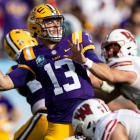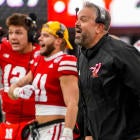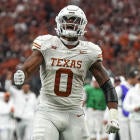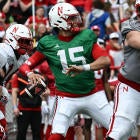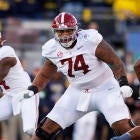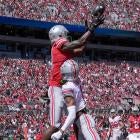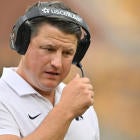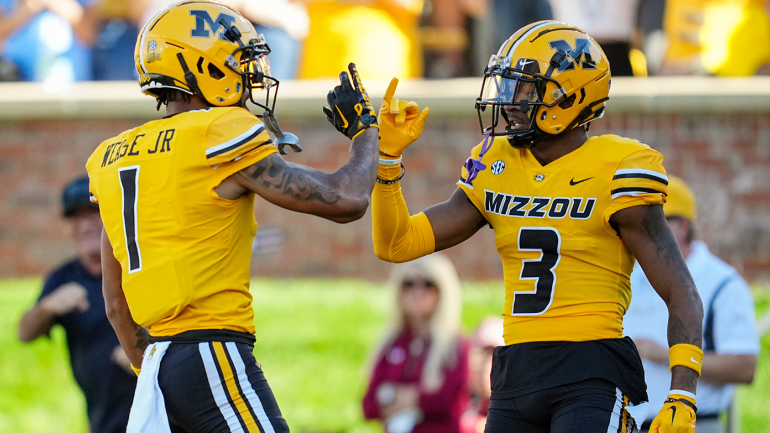
COLUMBIA, Mo. -- From his office overlooking Faurot Field, Eli Drinkwitz pulled out his phone. Missouri's coach quickly found a picture showing an intravenous line stuck into the upper leg of the SEC's second-leading rusher, Cody Schrader.
"They had to take 60 cc of hemoglobin out of his thigh after the South Carolina game," Drinkwitz said, almost proudly. "He's battled a thigh bruise, a pulled quad in the same thing. He just keeps going out there."
That moment sort of explains No. 12 Missouri to this point in the season. At 7-1 and heading to a showdown at No. 2 Georgia, the Tigers just keep going out there. For a program that hasn't enjoyed a winning season since 2018, whose glory years are at least a decade old, Saturday represents a huge opportunity.
Or maybe not. Mizzou is 0-17 all-time against No. 1 teams (Georgia is ranked as such in the AP Top 25). No shame there. That's why No. 1 teams are ranked No. 1. They win a lot. But the number disguises a legacy tucked away in the third-floor office of Mizzou historian Bob Brendel. The long-time sports information director has become responsible for organizing that legacy.
That office in the 50-year-old former basketball arena is filled with stacks of papers collectively showing why the Tigers should believe Saturday in Athens, Georgia.
Long before Drinkwitz or any of his players were born, Missouri was the upset king of the 1970s, perhaps of all time. Try to find another program that beat such a collection of powerhouses in such a narrow window.
In a seven-year span from 1972-78, Missouri upset 10 top-10 teams. Notre Dame, USC, Alabama, Nebraska all went down. There were more. These days, there are programs that haven't played that many top-10 opponents in their history.
"I think a lot of fans hung their hats on those upsets," Brendel said. "We weren't winning the Big Eight. You had to get through Oklahoma and Nebraska every year [in the conference]. Then we had nothing left either physically or emotionally. The schedules we played those year were brutal."
Missouri did it because of a scheduling philosophy established by legendary coach Don Faurot.
In the 1940s, Faurot -- also athletic director from 1935-42 -- made it his fiduciary duty to pay off the debt on the football and basketball buildings. The Tigers were made to play a series of road games for guaranteed money. From 1939-19, Missouri played at Ohio State nine times. The best the Tigers could do was a tie in 1946.
That fundraising/scheduling philosophy lingered all the way into the 1970s. Missouri would settle for a (successful) return to that age on Saturday. The Tigers have become the biggest challenger to Georgia in the SEC East, at least in the standings. If not for a shootout loss to LSU, they would be undefeated.
This week, as Mizzou prepares to play a No. 1 for the 18th time, it remains undeterred.
"I don't think the 25 games in a row matter," Drinkwitz said of Georgia's nation-leading winning streak. "I don't think the two national championships matter. I think the only thing that matters is, when we step on that football field, it's just going to be about us. Do we execute? Do we play within ourselves? Do we control the line of scrimmage?"
Missouri transfer wide receiver Theo Wease was on the Oklahoma team plane last year coming back from a game watching Mizzou play Georgia. The murmurs started in the cabin, "Georgia is about to lose."
The Bulldogs did not, of course, eventually prevailing 26-22. But the four-point margin still reflects the closest game Georgia has played in during that winning streak.
"I could see the fight in that team, how hungry they were, not letting a logo beat them," Wease said of his current teammates. "That woke me up a little bit, too … 'OK, they got heart. They're not just scared of a logo.'"
Georgia is more than a logo. Following last week's impressive win over Florida, coach Kirby Smart reminded the assembled media of what the SEC always comes down to -- who controls that line of scrimmage. Forget the schedule, that has been soft to this point. It's back-loaded beginning with the Tigers, so the Dawgs should have plenty of opportunities to "prove" themselves.
If that was ever a question.
Georgia is excelling at every level 10 weeks into the season. An emerging offensive line could one day see all five members be drafted, including 320-pound redshirt freshman Earnest Greene III. Right tackle Amarius Mims remains hurt. It doesn't matter. Carson Beck is seventh nationally in average passing yards. Beck enters his second full game without injured All-American tight end Brock Bowers.
The defense is coming off a game in which it blocked a punt, recorded a safety and sacked Florida quarterback Graham Mertz four times.
"I told our staff … If you believe we're out-scheming them, you're crazy," Drinkwitz said. "That's not how you're beating these guys. You're beating these guys on execution."
That gets us back to Schrader. He might as well be the poster Tiger this season. The transfer from Division II Truman State walked on after last season. A friend of Drinkwitz's saw Schrader working out at a local club.
"At that point, I wasn't planning on him being anything more than a scout team player," Missouri's coach said. "Cody showed up in January, and his mindset was he was coming to prove to everybody he belonged at this level. He started as an eighth-team running back and slowly moved his way up to starter. It wasn't injury or anything."
It was pure hard work. Schrader graduated last year. He missed a bowl practice because of that. From his office with a view, Drinkwitz later spied Schrader late on a Saturday night making up for the missed drills. He was in full gear running through a series of plays all by himself.
Today, Schrader practices what seems like a lost art -- running hard between the tackles. Only Kentucky's Ray Davis has run for more yards in the SEC.
Nothing seems to come easy to this program. Last season, kicker Harrison Mevis missed a 26-yard field goal at Auburn that would have won the game in regulation. In overtime, the game was lost with all the suddenness of a kick to the groin. Stanford transfer RB Nathaniel Peat fumbled as he stretched the ball out for the goal line.
A Week 3 upset of then-No. 15 Kansas State this season was a proof-of-concept moment. Mevis redeemed himself nailing an SEC-record 61-yard field goal to beat the Wildcats.
"Making that kick was kind of the glue that pulled it all together," said Drinkwitz. "[Players said,] 'OK, all this stuff that we've been preaching for three years really can work.'"
Drinkwitz and the Tigers needed something to work. This is the coach's first winning season at Mizzou in Year 4. Drink got the job because he was the next big offensive thing as offensive coordinator at Arkansas State, Boise State and NC State. In his only season as head coach before coming to Mizzou, Drinkwitz created buzz by going 12-1 at Appalachian State in 2019. This season, he gave up play calling duties to hire Kirby Moore, who had spent six years at Fresno State.
Consequently, junior QB Brady Cook has blossomed completing almost 70% of his passes. "Brady is definitely the chef. He's throwing meals," Wease said.
The team has rallied around the quarterback who played hurt last year with a sore shoulder and limped around against Kansas State with a hyperextended knee.
Five-star WR Luther Burden has developed into a legitimate star moving from outside into the slot. The SEC's No. 2-leading receiver was a CBS Sports All-American at the midway point. Schrader has provided the grit.
"You gotta have hard conversation with yourself," Drinkwitz said of giving up play calling duties. "You gotta look at yourself in the mirror and say, 'Am I giving our team the best chance to win?' You have to take your ego out of it. … My evaluation was I wasn't giving our team the best chance to win. I knew at the end of the year we had to do something different."
It also helped the mental health of long-time observers that Mevis' record field goal sailed through the north end zone where Tiger dreams have gone to die. The north end zone was the site of the Fifth Down (1990), the Flea Kicker (1997) and The Boink (2013). With a chance to go 8-0 for the first time in 53 years that season, Missouri's kicker clanked a field goal in overtime against South Carolina.
It was definitely a step up in competition for Missouri when it joined the SEC in 2012. But back in the 1970s, Missouri played schedules only the College Football Playoff Selection Committee could love. Talk about strength of schedule. It was maddening the Tigers almost never capitalized on those upsets.
In 1972, a week after being beaten by Nebraska, 62-0, the Tigers travelled to No. 8 Notre Dame and won 30-26. Missouri made it back-to-back wins over top 10 teams the next week beating No. 7 Colorado. Those Tigers finished 6-6. The biggest upset out of all of them might have been a 13-12 decision over No. 2 Nebraska in 1973. The Huskers were at the height of their powers. Missouri finished 8-4.
In 1975, the Tigers upset No. 2 Alabama, in Birmingham, 20-7 while opening the season on national television. Over the next 26 days, those games were followed up by wins against Illinois and at home against Wisconsin before a loss in Game 4 at Michigan. Counting conference play, Missouri played six top 15 teams that season, going 6-5. In 1976, the Tigers opened the season winning at USC; they won at No. 2 Ohio State three weeks later and played seven teams ranked in the top 16, finishing 6-5.
The best year of the decade might have been 1978. Missouri opened at defending national champion Notre Dame in Week 1, winning 3-0. The next week, it lost at home to Alabama, that year's eventual AP national champion. (USC was No. 1 in the Coaches Poll). Who else has ever done that? A 35-31 win at Nebraska to finish the regular reason remains one of the biggest in Missouri history. That year, the Tigers played four top-five teams. A team that featured three All-Big Ten selections, including consensus All-American Kellen Winslow, finished tied for third in the league at 8-4.
The upsets became so routine that students would go rip down the goal posts at Faurot Field when the team won a big game on the road. Then from 1983-97, the program didn't go to a bowling, which gets us close to today.
Gary Pinkel, Mizzou's all-time winningest coach, left the Tigers in great shape winning back-to-back SEC East titles in 2013-14.
That means it's been a decade since true relevancy. On Saturday, Mizzou is hoping for a game-changer between the hedges.














